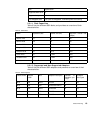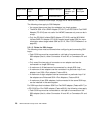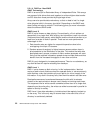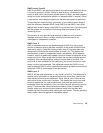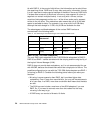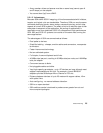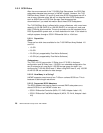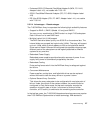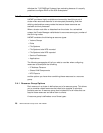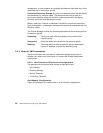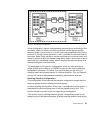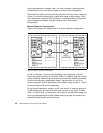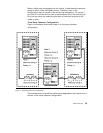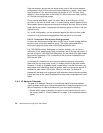Cluster Planning 27
• Enhanced SCSI-2 Differential Fast/Wide Adapter/A (MCA, FC: 2412,
Adapter Label: 4-C); not usable with 7135-110
• SCSI-2 Fast/Wide Differential Adapter (PCI, FC: 6209, Adapter Label:
4-B)
• DE Ultra SCSI Adapter (PCI, FC: 6207, Adapter Label: 4-L); not usable
with 7135-110
2.3.2.4 Advantages - Disadvantages
The 7135 RAIDiant Array incorporates the following high availability features:
• Support for RAID-1, RAID-3 (Model 110 only) and RAID-5
You can run any combination of RAID levels in a single 7135 subsystem.
Each LUN can run its own RAID level.
• Multiple Logical Unit (LUN) support
The RAID controller takes up only one SCSI ID on the external bus. The
internal disks are grouped into logical units (LUNs). The array will support
up to six LUNs, each of which appears to AIX as a single hdisk device.
Since each of these LUNs can be configured into separate volume groups,
different parts of the subsystem can be logically attached to different
systems at any one time.
• Redundant Power Supply
Redundant power supplies provide alternative sources of power. If one
supply fails, power is automatically supplied by the other.
• Redundant Cooling
Extra cooling fans are built into the RAIDiant Array to safeguard against
fan failure.
• Concurrent Maintenance
Power supplies, cooling fans, and failed disk drives can be replaced
without the need to take the array offline or to power it down.
• Optional Second Array Controller
This allows the array subsystem to be configured with no single point of
failure. Under the control of the system software, the machine can be
configured in
Dual Active
mode, so that each controller controls the
operation of specific sets of drives. In the event of failure of either
controller, all I/O activity is switched to the remaining active controller.
In the last few years, the 7133 SSA Subsystems have become more popular
than 7135 RAIDiant Systems due to better technology. IBM decided to



